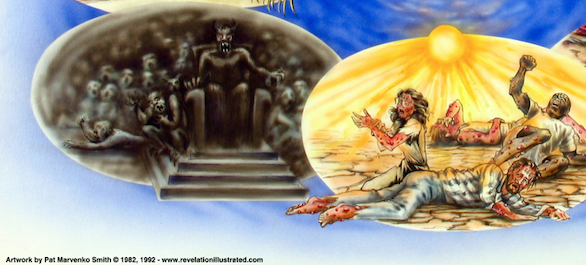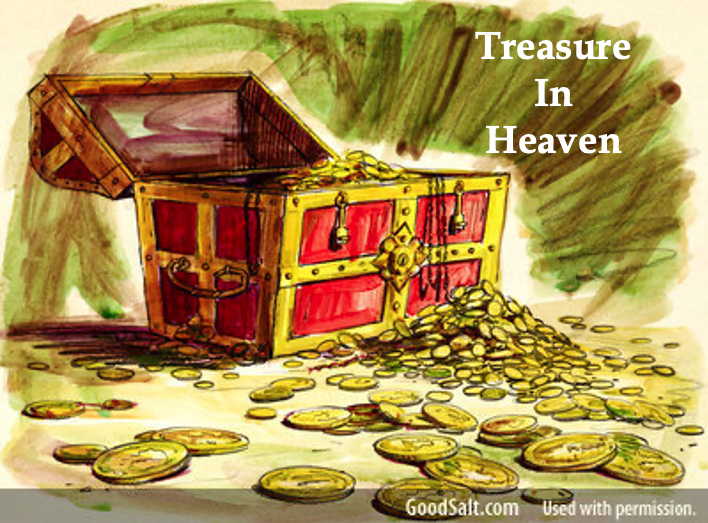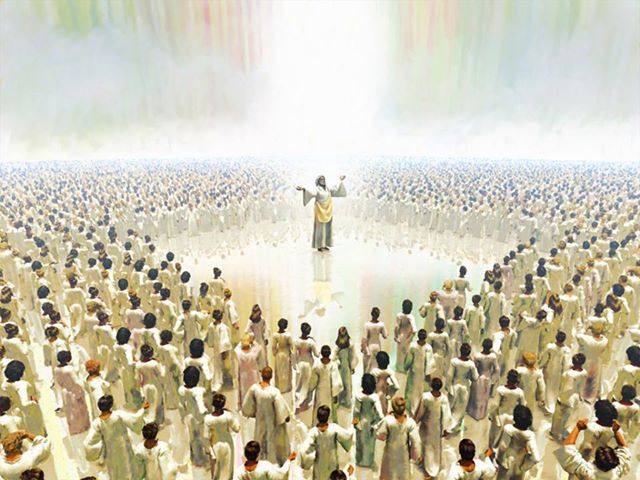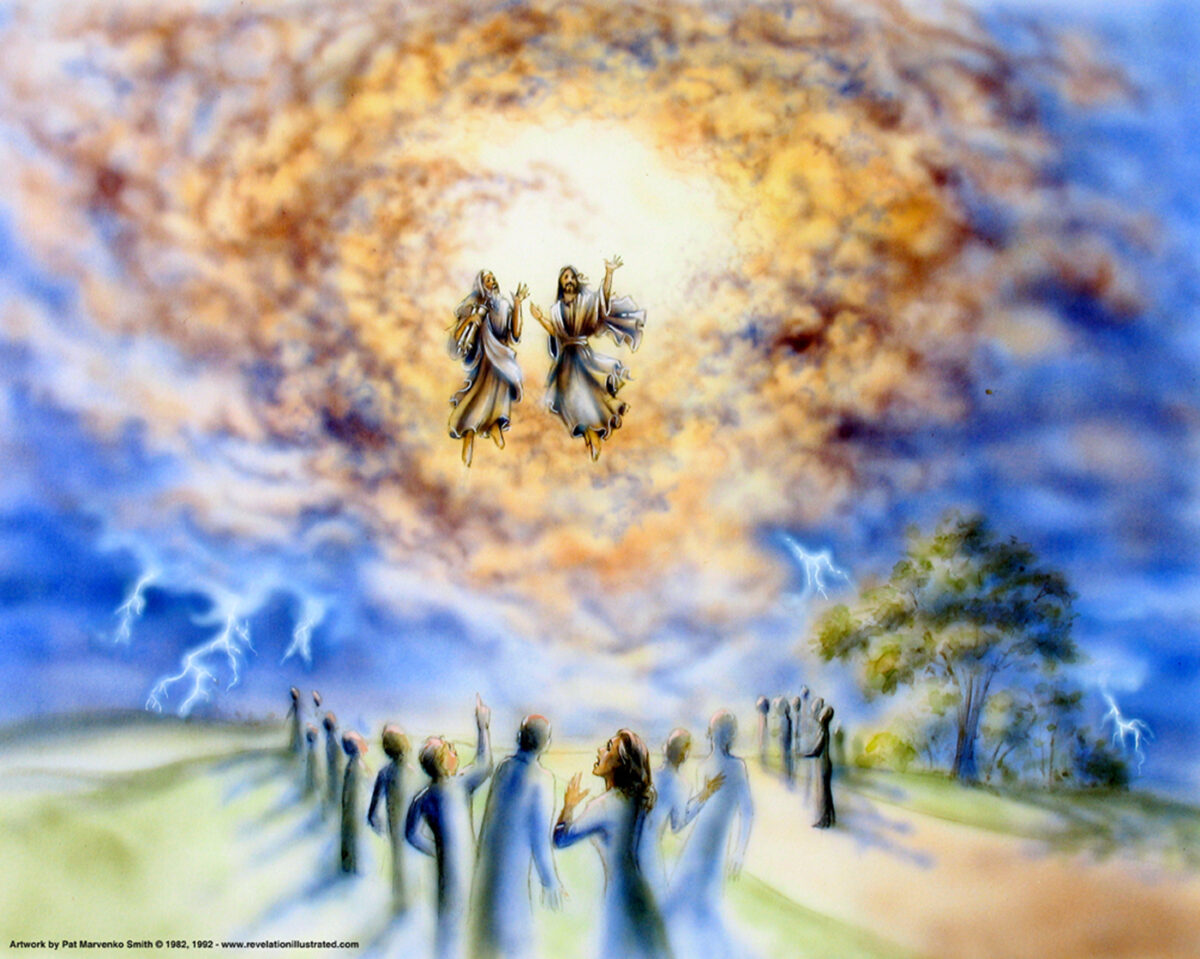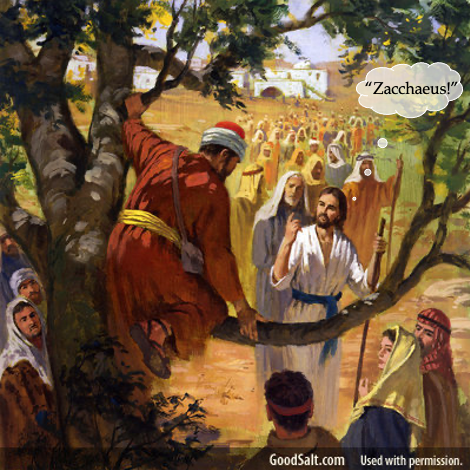“Now out of His mouth goes a sharp sword, that with it He should strike the nations. And He Himself will rule them with a rod of iron. He Himself treads the winepress of the fierceness and wrath of Almighty God.” Revelation 19:15
For centuries believers have prayed for Christ’s return to earth to set up His kingdom (cf. Matthew 6:10; Revelation 6:10; 22:20) and now the apostle John records the answer to their prayers (Revelation 19:11-21). Last time we saw that King Jesus is “Faithful” and “True” in contrast to the unfaithfulness and deception of the beast who leads the armies of the world to fight against Christ at Armageddon when Jesus returns with His church to the earth (19:11, 19; cf. 13:1-18; 16:12-16). The apostle John continues his description of Jesus Christ before he records His return to earth.
“His eyes were like a flame of fire, and on His head were many crowns. He had names written and a name written that no one knew except Himself.” (Revelation 19:12). Reference to Jesus’ “eyes” being “like a flame of fire” emphasizes His penetrating and all-knowing judgment of sin, that takes all things into account (cf. 1:14; 2:18). 1 Jesus has an instinctive “ability to render perfect judgment of every person and every situation (Hebrews 4:13).” 2 His gaze will be able to pierce the darkness of the kingdom of the beast and the very center of the souls of its citizens, exposing their deepest thoughts and motives. 3
Likewise, Christ is fully aware of all our thoughts, words, actions, and motives which is meant to motivate us to live holy lives before Him (cf. Hebrews 4:12-13). Only Jesus is qualified to judge us at the Judgment Seat of Christ. This is why the apostle Paul writes, “3 But with me it is a very small thing that I should be judged by you or by a human court. In fact, I do not even judge myself. 4 For I know of nothing against myself, yet I am not justified by this; but He who judges me is the Lord. 5 Therefore judge nothing before the time, until the Lord comes, who will both bring to light the hidden things of darkness and reveal the counsels of the hearts. Then each one’s praise will come from God.” (cf. I Corinthians 4:3-5). Sin-scarred Christians cannot accurately judge the lives and ministries of other Christians let alone their motives. 4 This is why Paul told the Corinthians it really didn’t matter if they judged him. In fact, he didn’t even judge himself because “He who judges” Paul “is the Lord.” At the Judgment Seat, Jesus “will both bring to light the hidden things of darkness and reveal the counsels of the hearts.” Only the Lord Jesus knows all the facts and can render a perfect and righteous judgment. So, it is time for Christians to stop playing God and start preparing for the Judgment Seat of Christ.
The fact Jesus had “many crowns” on “His head” (19:12) suggests He will not only defeat the beast or Man of Sin at His Second Coming, but all the world’s rulers and will acquire their crowns, as it were, upon Himself, 5 signifying His right to rule over the entire world (cf. I Chronicles 20:1-2; Psalm 47:8). 6 This image of Christ wearing “many crowns” inspired Matthew Bridges to write a majestic hymn that believers still enjoy singing:
“Crown Him with many crowns,
The Lamb upon His throne:
Hark! How the heav’nly anthem drowns
All music but its own!
Awake, my soul, and sing
Of Him who died for thee,
And hail Him as thy matchless King
Thro’ all eternity.” 7
Even though Christ’s glory will be openly manifested at His Second Coming, some aspects of His Personhood will remain beyond human comprehension 8 as implied by the phrase “He had names written and a name written that no one knew except Himself.” 9In John’s vision, he saw crowns having many “names” and one crown having “a name written that no one knew except” Jesus. Vacendak explains that this is like Isaiah 9:6 which describes Jesus the Messiah who will rule on the earth. Christ has multiple aspects to His nature and Person that are knowable: “Wonderful, Counselor, Mighty God, Everlasting Father, Prince of Peace” (Isaiah 9:6). However, not all facets of Christ’s Being are understandable to people; hence, Jesus possesses a name that is known only to Him – a name that reflects qualities beyond human understanding! 10
“Throughout the ancient world a name revealed the nature of an individual, who he is and what he is. The unknown name of the Christ comports with the fact that His nature, His relationships to the Father, and even His relationship to humanity, transcend all human understanding.” 11
“It is possible that there is another thought. Those who practiced magic in the first century believed that to know a name gave power over him whose name it was. John may well be saying that no-one has power over Christ. He is supreme. His name is known only to Himself.” 12
Swindoll writes, “Why would John bother to mention that Jesus had a secret name? Perhaps the secret name indicates a unique relationship with God the Father that nobody else shares.” 13Christ also extends the promise to overcoming (faithful) believers that He will give them “a white stone, and on the stone a new name written which no one knows except him who receives it”(2:17). This demonstrates the deep personal and inseparable relationship that faithful believers will enjoy with Christ in His coming kingdom. What Christ is by nature (unique, eternal, divine Son of God), faithful believers will reflect in a limited way by grace (adopted, finite, glorified children of God). 14
Next John writes, “He was clothed with a robe dipped in blood, and His name is called The Word of God.” (Revelation 19:13). In the context, the reference to Christ being “clothed with a robe dipped in blood” foreshadows His bloody judgment of His enemies – the beast and the armies of the world (19:19-21). In this vision, John did not see a meek and mild Savior who would shed His blood for the sins of the world, instead he saw a Warrior-King Who would establish His reign on earth by force. 15 His robe would be soaked in the blood of His enemies (Isaiah 63:3-4). 16
“His name is called The Word of God” because every thought, word, and action of Christ expresses God’s mind, words, and actions 17 even in events such as the bloody destruction of His enemies at Armageddon. 18 Not only does this title “The Word of God” represent the manifestation of God’s revelation, but it also signifies the manifestation of God Himself (cf. John 1:1). The “Word of God” is always “Immanuel… God with us” (Matthew 1:23). 19
Christ did not return to earth alone at the end of the Tribulation period. “And the armies in heaven, clothed in fine linen, white and clean, followed Him on white horses.” (Revelation 19:14). The clothing (“fine linen”) of these “armies in heaven” connects them with the Lamb’s faithful followers from the church age (19:7-8; cf. 2:10, 17, 25-27; 3:5, 10-11; 17:14). Since Christ’s troops are faithful believers from the church age, the fact that they are following King Jesus “on white horses” which symbolize victory, is an incredible testimony to their victorious lives. 20
Other Scriptures also inform us that God’s angels will accompany Christ to earth as well (cf. Matthew 16:27; 25:31; 2 Thessalonians 1:7-9). But it is not likely that angels will be riding on horses since Revelation 17:14 tells us that those who are with King Jesus when He returns to earth “are called, chosen, and faithful,” a reference to resurrected, glorified, and rewarded church age believers 21 (cf. Matthew 20:1-16; 22:1-14).
Only King Jesus will have a weapon with which to defeat His enemies when He returns. “Now out of His mouth goes a sharp sword, that with it He should strike the nations. And He Himself will rule them with a rod of iron. He Himself treads the winepress of the fierceness and wrath of Almighty God.” (Revelation 19:15). You may recall in Revelation 6:2 that Jesus sat on “a white horse” carrying “a bow” in contrast to Him using a “sword” herein 19:15.
“The bow is the weapon of long-range warfare, whereas the sword is the weapon used in close combat with the enemy. If the rider of 6:2 represents Christ as the Initiator of all God’s judgments upon His enemies, it is clear that throughout the Tribulation He fights with them, so to speak, at long range. For the judgments of the Tribulation are such as fall from heaven to earth while the King is absent. But in chapter 19, the King comes personally to earth and now the conflict with the forces of evil is waged at close quarters and, with the sword, the last battle is won. And just quite naturally the sword is thought in connection with His Word – for it proceeds out of His mouth – so also may the bow be linked with the same Word. As the prophet Habakkuk has written, 22
“Your bow was made quite ready; oaths were sworn over Your arrows.” (Habakkuk 3:9). Hence, the judgment-bringing Word of God is seen first under the figure of a “bow” foreshadowing Jesus’ conquests over His enemies from long range in heaven (6:2) until the final battle when He returns to earth in Chapter 19 as the last, white-horse Rider fighting and winning at close range with a “sword” (19:11-21). 23
Instead of King Jesus using physical weapons of mass destruction, the “sword” He will use will come “out of His mouth” to “strike the nations” who have gathered with the beast at Armageddon (cf. 16:12-16; 19:19). This “sword” is the powerful and supernatural Word of God (cf. Hebrews 4:12). 24 Just as Jesus spoke and the universe was created (Genesis 1; John 1:2-3; Colossians 1:16; Hebrews 1:1-2), so He will speak, and the nations of the world will be demolished (Revelation 19:15; cf. Psalm 2:5; Zechariah 14:12). 25
This stern judgment King Jesus will bring against His enemies will characterize His reign as King over all the earth during the Millennial Kingdom as He “will rule” the nations “with a rod of iron” (cf. Psalm 2:8-9). Under King Jesus’ reign, there will be inflexible righteousness. All who live on planet earth during His one-thousand-year reign will be commanded to live according to the laws and decrees of the King. Believers in Jesus who already have glorified bodies will obey Him perfectly because they will be “like Him” (I John 3:2). 26
So strick will King Jesus’ rule be during the Millennium that those who do not believe in Christ could be in danger of “hell fire” for calling someone a “fool.” During Jesus’ Sermon on the Mount, He applied the fulfillment of the Law to the Millennial Kingdom when He would rule with a rod of iron. 27 Christ said, “But I say to you that whoever is angry with his brother without a cause shall be in danger of the judgment. And whoever says to his brother, ‘Raca!’ shall be in danger of the council. But whoever says, ‘You fool!’ shall be in danger of hell fire.” (Matthew 5:22). Christ’s reign during the Millennial Kingdom will be so strict that a person could go on trial (“judgment”) for unjustified anger (“angry… without a cause”) with his brother. Whoever bullies his brother and calls him “Raca,” which means“numskull” or “empty one,” 28 would go on trial before the “council” or Supreme Court. If worse language is used (“You fool”), the offender may be thrown immediately into “hell.” The decision will be up to King Jesus, the Judge, to determine if they go to hell during the Millennial Kingdom.
This severe of punishment is reserved for nonbelievers since a believer in Jesus cannot lose eternal life (John 6:35-40; 10:28-29). Amazingly, there will be many nonbelievers who will rebel toward the end of the thousand-year reign of Christ (Revelation 20:7-10). But for believers in Jesus, both then and now, this picture of kingdom righteousness challenges us to live like kingdom subjects by refraining from inappropriate expressions of anger.
King Jesus will punish His enemies gathered at Armageddon like the trampling of grapes in a “winepress” which portrays “the fierceness and wrath of Almighty God” (19:15b). Ruling includes destroying the wicked, not just reigning over the righteous. 29
“The treading of this winepress by Christ will result in the blood of His enemies flowing like a river for two hundred miles at a depth of about four or five feet” (14:19-20). 30
Once King Jesus tramples His enemies under His feet, His reign will be absolute and worldwide and He will bear a name that only He deserves. 31 “And He has on His robe and on His thigh a name written: KING OF KINGS AND LORD OF LORDS.” (Revelation 19:16). This title for Jesus identifies Him as the supreme human Ruler over all the earth (“KING OF KINGS”) and also as God Almighty (“LORD OF LORDS”)! Jesus Christ is King over all who call themselves “king,” and Lord above all who call themselves “lord.” 32
Because Jesus is “KING OF KINGS AND LORD OF LORDS,” “conquering every enemy on earth will be a matter of relative ease. It will be a matter of speaking.
“This is nothing new, though. From Genesis to Revelation, Jesus is pictured as possessing an authoritative Word. John 1:1 says of Jesus, ‘In the beginning was the Word, and the Word was with God, and the Word was God.’ At creation Jesus spoke the words, ‘Let there be light’ (Genesis 1:3), and by His Word light came about. It was by that same authoritative Word that Jesus caused the devil to flee in the wilderness (see Matthew 4:1-11) and sent a legion of demons out of a demon-possessed man and into a herd of pigs (see Mark 5:1-13). In each of these instances, the way He brought out powerful results was by speaking His Word. And it shall be at the end of time.
“Likewise, for followers of Jesus, we must not simply know God’s Word or study it, but also verbally quote it. So, when was the last time you actually quoted God to another person or even to the devil in order to handle a specific situation? If you have truly received authority from God – which all believers have – and you quote the Word accurately to people or forces of Satan, it carries intrinsic authority to accomplish God’s purposes. In some cases, it draws a person to salvation. In others, it causes a hardened sinner to be without excuse for his or her conduct. In no situation, however, will a child of God verbally quote and obey the Word of God and have that Word return empty (see Isaiah 55:11).” 33
Prayer: Heavenly Father, as we watch the world increase in chaos and conflict as evil continues to increase, we are deeply grateful for this vision John receives of King Jesus before He returns to earth to defeat His enemies at close range using His sword – the powerful Word of God – to establish His universal reign on the earth as King of kings and Lord of lords! Thank You Lord God Almighty for entrusting the Word of God to those of us who believe in Jesus to share with a lost world so that same Word may persuade them to cross over from eternal death into eternal life simply by believing in Jesus for His gift of salvation. Lord of lords and King of kings, we not only look to You to conquer evil and sin in the future Tribulation period, but we also trust You to lead us into victory over evil and sin in our own lives. Help us not only to know and study Your Word, but to speak it to others including Satan and his followers, so Your purposes will be accomplished for Your glory. May we never underestimate what Your spoken Word can do in any situation we may face. Please bring Your Word to our hearts and minds especially in times of spiritual battle so we may speak it to our enemies whether they be physical or spiritual. In Your mighty name we pray, King Jesus. Amen.
ENDNOTES:
1. Tom Constable, Notes on Revelation, 2017 Edition, pg. 210.
2. Bob Vacendak; Robert Wilkin; J. Bond; Gary Derickson; Brad Doskocil; Zane Hodges; Dwight Hunt; Shawn Leach; The Grace New Testament Commentary: Revised Edition (Grace Evangelical Society, Kindle Edition, 2019), pg. 1574.
3. Charles R. Swindoll, Insights on Revelation (Swindoll’s Living Insights New Testament Commentary Book 15, Tyndale House Publishers, Inc., 2014 Kindle Edition), pg. 342.
4. Tony Evans, CSB Bibles by Holman, The Tony Evans Study Commentary (B & H Publishing Group, Kindle Edition 2019), pg. 1980.
5. Constable, pg. 210.
6. John F. Walvoord, The Bible Knowledge Commentary Epistles and Prophecy, Editors John F. Walvoord and Roy B. Zuck (David C. Cook, 2018 Kindle Edition), location 6275 to 6280.
7. Swindoll, pg. 343 quotes Matthew Bridges, “Crown Him with Many Crowns,” in The Hymnal for Worship and Celebration (Dallas: Word Music, 1986), no. 234.
8. Evans, pg. 2415.
9. The majority of Greek manuscripts add the phrase “names written, and” (onomata gegrammena kai).
10. Vacendak, pp. 1574-1575.
11. Constable, pg. 210 quotes George Raymond Beasley-Murray, The Book of Revelation New Century Bible Commentary series, revised ed. (London: Morgan & Scott, 1974); reprint ed. (Grand Rapids: Wm. B. Eerdmans Publishing Co., and London: Marshall, Morgan & Scott, 1983), pp. 279-280; cf. Henry Barclay Swete, The Apocalypse of St. John, 2nd ed. (London: Macmillan and Co., Let., 1907), pg. 252; William Barclay, The Revelation of John, Vol. 2, The Daily Study Bible series, 2nd ed. (Edinburgh: Saint Andrew Press, 1964), pg. 232.
12. Constable, pg. 211 quotes Leon Morris, The Revelation of St. John, Tyndale New Testament Commentary series, Reprint ed. (Leicester, England: Inter-Varsity Press, and Grand Rapids: Wm. B. Eerdmans Publishing Co., 1984), pg. 230.
13. Swindoll, pg. 343.
14. Adapted from Ibid. Swindoll thinks Revelation 2:17 applies to all believers, but I believe this promise is limited to overcoming believers who are faithful to Christ to the end of their lives on earth (cf. 2:10b, 25-27).
15. Evans, pg. 2415.
16. Swindoll, pp. 343-344; Constable, pg. 211.
17. Constable, pg. 211.
18. Vacendak, pg. 1575.
19. Swindoll, pg. 344.
20. Vacendak, pg. 1575.
21. Swindoll, pg. 344; cf. Constable, pg. 211.
22. Zane C. Hodges, “The First Horseman of the Apocalypse,” Bibliotheca Sacra, 119:476 (October 1962), pg. 333.
23. Ibid., pp. 333-334.
24. Vacendak, pg. 1575.
25. Ibid.
26. Ibid.
27. Zane C. Hodges, Grace In Eclipse: A Study On Eternal Rewards (Grace Evangelical Society, 2016 Kindle Edition), pp. 36-38.
28. Walter Bauer, A Greek-English Lexicon of the New Testament and Other Early Christian Literature: Third Edition (BDAG) revised and edited by Frederick William Danker (Chicago: University of Chicago Press, 2000 Kindle Edition), pg. 903.
29. Constable, pg. 212.
30. Vacendak, pg. 1575.
31. Ibid., pg. 1576.
32. Swindoll, pg. 345.
33. Evans, pp. 2415-2416.


